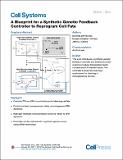| dc.contributor.author | Del Vecchio, Domitilla | |
| dc.contributor.author | Abdallah, Hussein M. | |
| dc.contributor.author | Qian, Yili | |
| dc.contributor.author | Collins, James J. | |
| dc.date.accessioned | 2018-08-28T15:05:06Z | |
| dc.date.available | 2018-08-28T15:05:06Z | |
| dc.date.issued | 2017-01 | |
| dc.date.submitted | 2016-07 | |
| dc.identifier.issn | 2405-4712 | |
| dc.identifier.uri | http://hdl.handle.net/1721.1/117580 | |
| dc.description.abstract | To artificially reprogram cell fate, experimentalists manipulate the gene regulatory networks (GRNs) that maintain a cell's phenotype. In practice, reprogramming is often performed by constant overexpression of specific transcription factors (TFs). This process can be unreliable and inefficient. Here, we address this problem by introducing a new approach to reprogramming based on mathematical analysis. We demonstrate that reprogramming GRNs using constant overexpression may not succeed in general. Instead, we propose an alternative reprogramming strategy: a synthetic genetic feedback controller that dynamically steers the concentration of a GRN's key TFs to any desired value. The controller works by adjusting TF expression based on the discrepancy between desired and actual TF concentrations. Theory predicts that this reprogramming strategy is guaranteed to succeed, and its performance is independent of the GRN's structure and parameters, provided that feedback gain is sufficiently high. As a case study, we apply the controller to a model of induced pluripotency in stem cells. Keywords: feedback control; synthetic biology; cell fate; reprogramming; multistability; gene regulatory network | en_US |
| dc.description.sponsorship | National Institute of General Medical Sciences (U.S.) (Grant P50 GMO98792) | en_US |
| dc.publisher | Elsevier | en_US |
| dc.relation.isversionof | http://dx.doi.org/10.1016/J.CELS.2016.12.001 | en_US |
| dc.rights | Creative Commons Attribution-NonCommercial-NoDerivs License | en_US |
| dc.rights.uri | http://creativecommons.org/licenses/by-nc-nd/4.0/ | en_US |
| dc.source | Elsevier | en_US |
| dc.title | A Blueprint for a Synthetic Genetic Feedback Controller to Reprogram Cell Fate | en_US |
| dc.type | Article | en_US |
| dc.identifier.citation | Del Vecchio, Domitilla et al. “A Blueprint for a Synthetic Genetic Feedback Controller to Reprogram Cell Fate.” Cell Systems 4, 1 (January 2017): 109–120 © 2017 The Authors | en_US |
| dc.contributor.department | Institute for Medical Engineering and Science | en_US |
| dc.contributor.department | Massachusetts Institute of Technology. Department of Biological Engineering | en_US |
| dc.contributor.department | Massachusetts Institute of Technology. Department of Electrical Engineering and Computer Science | en_US |
| dc.contributor.department | Massachusetts Institute of Technology. Department of Mechanical Engineering | en_US |
| dc.contributor.department | Massachusetts Institute of Technology. Synthetic Biology Center | en_US |
| dc.contributor.mitauthor | Del Vecchio, Domitilla | |
| dc.contributor.mitauthor | Abdallah, Hussein M. | |
| dc.contributor.mitauthor | Qian, Yili | |
| dc.contributor.mitauthor | Collins, James J. | |
| dc.relation.journal | Cell Systems | en_US |
| dc.eprint.version | Final published version | en_US |
| dc.type.uri | http://purl.org/eprint/type/JournalArticle | en_US |
| eprint.status | http://purl.org/eprint/status/PeerReviewed | en_US |
| dc.date.updated | 2018-08-27T19:18:54Z | |
| dspace.orderedauthors | Del Vecchio, Domitilla; Abdallah, Hussein; Qian, Yili; Collins, James J. | en_US |
| dspace.embargo.terms | N | en_US |
| dc.identifier.orcid | https://orcid.org/0000-0001-6472-8576 | |
| dc.identifier.orcid | https://orcid.org/0000-0002-1097-0401 | |
| dc.identifier.orcid | https://orcid.org/0000-0002-5560-8246 | |
| mit.license | PUBLISHER_CC | en_US |
